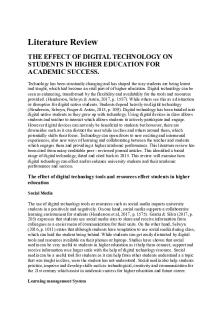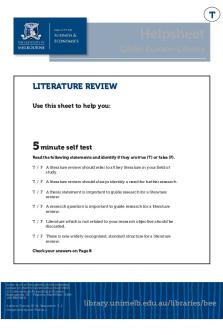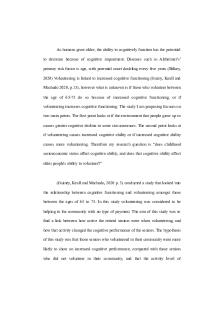2020PSY Copy of Literature Review Rubric (1)-7 PDF

| Title | 2020PSY Copy of Literature Review Rubric (1)-7 |
|---|---|
| Author | Chase Nesbit |
| Course | Positive Psychology |
| Institution | Utah Valley University |
| Pages | 3 |
| File Size | 113.6 KB |
| File Type | |
| Total Downloads | 62 |
| Total Views | 140 |
Summary
lit review rubric...
Description
Final Literature Review Rubric Criteria
Does not meet expectations
Approaching expectations
Meets expectations
Exceeds expectations
Title is present, conveys the main idea of the paper, captures the interest of the reader
(0-1 point)
(2-3 points)
(4 points)
(5 points)
Research Question:
Research question is trite or absent (0-1 point)
Research question is overly general but makes an arguable claim (2-3 points)
Research question addresses a relevant and consequential problem area (4 points)
Research question advances a new argument or perspective (5 points)
Introduction
Position is absent. Both sides of the argument are presented without the author making their own position clear. Organization of argument is missing
Position is vague. Organization of argument is illogical or not consistently maintained
Position is clearly stated. Organization of argument is clear in parts or only partially described and mostly implemented.
Position and exceptions, if any, are clearly stated. Organization of the argument is completely and clearly outlined and implemented.
(2-3 points)
(4 points)
(5 points
(0-1 point) Research Articles
Research selected is not relevant to the argument or is vague and incomplete – components are missing or inaccurate or unclear. Theory is not relevant or only relevant for some aspects; theory is not clearly articulated and/or has incorrect or incomplete components. Relationship between theory and research is unclear or inaccurate, major errors in the logic are present.
Research selected is not relevant to the argument or is vague and incomplete – components are missing or inaccurate or unclear. Theory is not relevant or only relevant for some aspects; theory is not clearly articulated and/or has incorrect or incomplete components. Relationship between theory and research is unclear or inaccurate, major ( errors in the logic are present. (5-9 points)
(0-4 points)
Research is relevant to the argument and is mostly accurate and complete – there are some unclear components or some minor errors in the method, results or implications. Theory is relevant and accurately described, some components may not be present or are unclear. Connection to theory is mostly clear and complete, or has some minor errors. (10-14 points)
Research selected is highly relevant to the argument, is presented accurately and completely – the method, results, and implications are all presented accurately; Theory is relevant, accurately described and all relevant components are included; relationship between research and theory is clearly articulated and accurate. (15-20 points)
Logic
Logic is unevenly presented or filled with holes. (0-1 points)
Logic follows a loose thread, but is easily lost in the presentation of other points of view (2-3 points)
There are no major holes in the argument(s). Supporting evidence is described in enough detail to make the appropriate point. (4 points)
There are no major holes in the argument(s). Supporting evidence is described in enough detail to make the appropriate point. Counter arguments are acknowledged (where appropriate) and discussed.
(5 points) Analysis
Does not present an adequate array of scholarly ideas Does not consider the context or considers it in an ego- or sociocentric way Does not consider multiple points of view (0-4 points)
Does not engage successfully with scholarly conversation in the subject area Considers the context and assumptions of the scholarly discourse in a limited way Considers multiple viewpoints and ideas tentatively or overstates the conflict (5-9 points)
Engages in scholarly conversation through intertextual means
Engages in scholarly conversion and defends an original perspective using inter textual means
Examines the context and explores the assumptions of the scholarly discourse
Critiques context of the scholarly discourse in terms of the students assumptions
Integrates multiple viewpoints and compares ideas or perspectives (10-14 points)
Integrates different disciplinary and epistemological ways of knowing and includes evidence of reflection and self assessment (15-20 points)
Conclusion
Fails to identify conclusions or the conclusions presented are simplistic and absolute. (0-4 points)
Conclusions are only loosely tied to the arguments and evidence presented. No effort is made to identify future research areas (5-9 points)
Conclusion are logical based on arguments and evidence presented. Efforts are made to identify future research areas. (10-14 points)
The implications of the review are clear (clearly stated, or inherently obvious). There is a discussion of where the holes in the literature are, and/or what direction future research should take. (15-20 points)
Organization
Shows little attempt to guide the reader through the document. Order of ideas in paragraphs is usually difficult to follow. (0-1 points)
Facilitates understanding but has occasional lapses. Order of ideas in paragraphs is apparent but occasionally difficult to follow (2-3 points)
Demonstrates awareness of document design appropriate for the intended reader. Order of ideas in paragraphs and subsections is easy to follow
Document design facilitates understanding and respect rhetorical conventions in the field. Transitions between ideas enhance the presentation in paragraphs and subsections
(5 points)
(4 points)
Language and voice
Grammar and Spelling
Voice fluctuates repeatedly (0-1 point)
Lapses in tone and voice are distracting. Written almost entirely in passive voice. (2-3 points)
Distinguishes own voice from those of the sources. Some instance of the passive voice are present (4 points)
Seamlessly weaves their own voice with those of the sources. Active
Grammar, punctuation, and spelling errors are prominent (0-1 point)
Some grammar, punctuation, and spelling errors throughout (2-3 points)
Grammar, punctuation and spelling are typically correct (4 points)
There are no grammar, punctuation, or spelling errors in the document. (5 points)
voice is used exclusively (5 points)
APA Style
No APA formatting (0-2 point)
The paper is not spaced or formatted correctly in places. In text citations are not used or are used incorrectly. (3-5 points)
The paper is double spaced, with appropriate use of headings throughout. Few, if any, errors in in-text citations. Reference page is included and properly formatted. APA conventions are followed. (6-9 points)
No errors in APA style (10 points)
Incorporated Previous Feedback
No incorporation or acknowledgment of feedback. (0-2 points)
Changes have been made but appear random or only loosely based on previous feedback. (3-5 points)
The paper includes a page with a brief description of feedback received on the previous draft, and how that has been incorporated into this draft (6-9 points)
.Exceptional care has been taken to consider previous feedback and improve the paper. (10 points)...
Similar Free PDFs

REVIEW OF RELATED LITERATURE
- 16 Pages

Sampling- A review of literature
- 16 Pages

Literature Review
- 10 Pages

Literature Review
- 9 Pages

Literature Review
- 6 Pages

Literature Review
- 32 Pages

Literature Review
- 9 Pages

Literature Review
- 5 Pages

Literature Review
- 15 Pages

Literature Review
- 4 Pages

Literature Review
- 16 Pages

Copy of Chapter 02 Review
- 3 Pages

Copy of Fortinberry 1 - Review
- 45 Pages

Rubric for book review
- 2 Pages
Popular Institutions
- Tinajero National High School - Annex
- Politeknik Caltex Riau
- Yokohama City University
- SGT University
- University of Al-Qadisiyah
- Divine Word College of Vigan
- Techniek College Rotterdam
- Universidade de Santiago
- Universiti Teknologi MARA Cawangan Johor Kampus Pasir Gudang
- Poltekkes Kemenkes Yogyakarta
- Baguio City National High School
- Colegio san marcos
- preparatoria uno
- Centro de Bachillerato Tecnológico Industrial y de Servicios No. 107
- Dalian Maritime University
- Quang Trung Secondary School
- Colegio Tecnológico en Informática
- Corporación Regional de Educación Superior
- Grupo CEDVA
- Dar Al Uloom University
- Centro de Estudios Preuniversitarios de la Universidad Nacional de Ingeniería
- 上智大学
- Aakash International School, Nuna Majara
- San Felipe Neri Catholic School
- Kang Chiao International School - New Taipei City
- Misamis Occidental National High School
- Institución Educativa Escuela Normal Juan Ladrilleros
- Kolehiyo ng Pantukan
- Batanes State College
- Instituto Continental
- Sekolah Menengah Kejuruan Kesehatan Kaltara (Tarakan)
- Colegio de La Inmaculada Concepcion - Cebu

